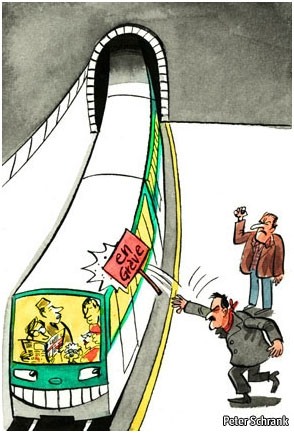『无人驾驶的地铁列车不仅是新科技的产物,也是严厉的劳动法催生的结果。』
France and automation: Driverless, workless
法国和自动化:无人驾驶,人无工作
Nov 26, 2011 | from The Economist

THE bold fuchsia-pink and tangerine-orange stripes of the upholstery are shocking enough, but the really unsettling feature of the new trains on the Paris metro is the lack of a driver. Sit in front and you get a picture-window forward view as the train tears through a dark tunnel. This month, the first automatic trains went into service on line one, the capital’s busiest, running from La Défense to the Château de Vincennes. With trains guided remotely from a control room and protective platform-edge barriers, the new trains seem to operate entirely on their own.
At a launch ceremony all the talk was of engineering and operational prowess. Paris already has driverless trains on line 14, the world’s first fully automatic underground line. But that was built from scratch. Never before has such an old line, this one dating to 1900, been re-equipped with reconfigured platforms and new electronics, for driverless trains. On a line that carries 725,000 passengers a day, and despite difficult talks with trade unions, all the work took place without a shutdown.
The main aim is better service. By eliminating human error, driverless trains are “incomparably” safer, says Gérard Churchill, in charge of installing the automatic line. Since opening in 1998, line 14 has had no accidents. Trains can run closer together. Extra services can be laid on at the last minute during unexpectedly busy times. But could there be another unspoken benefit? Driverless trains cannot go on strike. “It was not an objective,” insists Mr Churchill. “But it is true that, during industrial unrest, automatic trains are much more reliable.”
Strict labour laws, costly payroll charges and erratic strikes seem to make French firms especially keen on technology. Supermarkets, for instance, have enthusiastically adopted self-checkout tills. “All French hypermarkets have adopted this strategy over the past few years,” says Alexis Lecanuet at Accenture, a consultancy. The idea is to speed up queues at peak times for impatient non-technophobes carrying light baskets. But it also cuts costs. “Self-checkout has worked better in countries where labour is expensive,” says Serguei Netessine, a professor at INSEAD, a business school.
France excels at high-tech services: credit-card operated petrol stations, touch-screen fast-food counters, automatic car-washing. Two years ago, McDonalds pioneered the use of touch-screen, credit-card-based ordering in its French fast-food restaurants. Eléphant Bleu, a self-service high-pressure car-washing chain, has 472 outlets in France, and is expanding. All this in a country where the labour code runs to over 3,300 pages, an employer pays an average of 39% in payroll taxes, and unemployment is at 10%. Spot the connection. (428 words)
热门推荐:
考研网校哪个好
新东方考研培训班
考研培训班
考研培训机构哪个好
考研英语网络课程
文都考研网校
北京考研培训班

